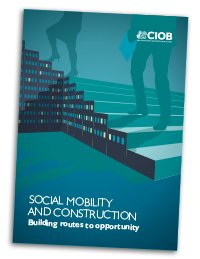Social mobility and construction: Building routes to opportunity
On 19 December 2016, the Chartered Institute of Building (CIOB) published a report highlighting the critical role construction plays in reversing declining levels of economic and social mobility in the UK.
Social Mobility and Construction: Building Routes to Opportunity suggests the construction sector is one of the few sectors that still employs a large number of traditional-skilled trades, roles that often lead onto more managerial positions. According to the report: ‘Construction in the UK now accounts for a third of all employment in this occupation group and a greater proportion of new job opportunities.’
The report calls on the government to help champion the UK as a world leader in construction excellence.
The survey of 1,094 working adults was undertaken by ComRes in August 2016 to gather views on aspects relating to social and economic mobility. Construction was ranked third, behind professional and scientific, and banking, as the industries that would do most to help poorer people improve their economic status.
However, the survey found that construction was seen as less effective at promoting social status; reflecting perhaps the poor image of the industry that persists with the public-at-large.
The report makes a list of recommendations for business, industry, professional bodies and government:
Construction businesses:
- Focus on better human resource management.
- Introduce and/or expand mentoring schemes.
- Boost investment in training.
- Develop talent from the trades as potential managers and professionals.
- Engage with the community and local education establishments.
Industry:
- Rally around social mobility as a collective theme.
- Promote better human resource management and support the effort of businesses.
- Promote and develop the UK as an international hub of construction excellence.
- Support diversity and schemes that widen access to management and the professions.
- Emphasise and spread understanding of the built environment’s impact on social mobility.
Professional bodies and institutions:
- Drive the aspirations of 'Professions for Good' for promoting social mobility and diversity.
- Support wider access to the professions and support those from less-privileged backgrounds.
- Promote and develop the UK as an international hub of construction excellence.
- Emphasise and spread understanding of the built environment’s impact on social mobility.
- Provide greater routes for degree-level learning among those working within construction.
Government:
- Produce a plan to boost the UK as an international hub of construction excellence, as a core part of the Industrial Strategy.
- Provide greater funding to support the travel costs of apprentices.
- Support wider access to the professions and support those from less-privileged backgrounds.
- Place greater weight in project appraisal on the impact the built environment has on social mobility.
Paul Nash, President of the CIOB said:
“Social mobility is fast becoming one of the defining issues of our time. I joined the construction industry at 18 as a management trainee with a construction company; I went on to gain a post-graduate qualification through advice from my professional body. I now sit here as President of the CIOB. I never thought I’d be in the position I am today but stories such as mine show the quality of opportunity that exists in construction.”
--CIOB
[edit] Find out more
[edit] Related articles on Designing Buildings Wiki
- A Blueprint for Change report.
- Access and inclusion in the built environment: policy and guidance.
- Articles by CIOB on Designing Buildings Wiki.
- Changing lifestyles in the built environment.
- Collaboration for Change, The Edge Commission Report on the Future of Professionalism.
- Equal opportunities policy.
- Human resource management in construction.
Featured articles and news
Increased vigilance on VAT Domestic Reverse Charge
HMRC bearing down with increasing force on construction consultant says.
Call for greater recognition of professional standards
Chartered bodies representing more than 1.5 million individuals have written to the UK Government.
Cutting carbon, cost and risk in estate management
Lessons from Cardiff Met’s “Halve the Half” initiative.
Inspiring the next generation to fulfil an electrified future
Technical Manager at ECA on the importance of engagement between industry and education.
Repairing historic stone and slate roofs
The need for a code of practice and technical advice note.
Environmental compliance; a checklist for 2026
Legislative changes, policy shifts, phased rollouts, and compliance updates to be aware of.
UKCW London to tackle sector’s most pressing issues
AI and skills development, ecology and the environment, policy and planning and more.
Managing building safety risks
Across an existing residential portfolio; a client's perspective.
ECA support for Gate Safe’s Safe School Gates Campaign.
Core construction skills explained
Preparing for a career in construction.
Retrofitting for resilience with the Leicester Resilience Hub
Community-serving facilities, enhanced as support and essential services for climate-related disruptions.
Some of the articles relating to water, here to browse. Any missing?
Recognisable Gothic characters, designed to dramatically spout water away from buildings.
A case study and a warning to would-be developers
Creating four dwellings... after half a century of doing this job, why, oh why, is it so difficult?
Reform of the fire engineering profession
Fire Engineers Advisory Panel: Authoritative Statement, reactions and next steps.
Restoration and renewal of the Palace of Westminster
A complex project of cultural significance from full decant to EMI, opportunities and a potential a way forward.
Apprenticeships and the responsibility we share
Perspectives from the CIOB President as National Apprentice Week comes to a close.
























